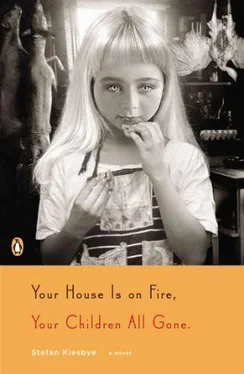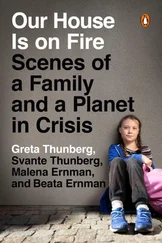On the ride home, he nudged me with his elbow. “I’m glad we had this talk. I want to be your good friend. If you have problems with a girl—I know a thing or two. Just ask.”
On Christmas Eve my nerves were strung so tight that my head ached and I couldn’t sit still. I endured the morning chores, chewed through the obligatory lunch of sausages and potato salad. In the afternoon I bundled up. Under the pretense of having something important to do in preparation for the Bescherung , the exchanging and unwrapping of gifts that evening after dinner, I hurried outside.
We hardly ever had snow on Christmas. In our village snow and ice would arrive a week or two later and stay until February. Now it was merely cold, and rain was falling softly. Yet the weather did nothing to soothe me. I was a prisoner in my body. I should have been able to rip it open and escape, but I was stuck in my flesh, stuck in my family, stuck in Hemmersmoor. Nothing fit.
I ran down to the Droste, where Sylvia, a girl some years older than me, was standing on the bank, throwing small stones and branches into the water.
“Hi,” I said.
“Hi,” she said without interest.
“Aren’t you home?” I asked stupidly.
She laughed at the question, but nicely. “No, I’m not. I’m waiting,” she said.
“For what?” I asked.
“For someone,” she corrected me, blushing.
“For whom?” I asked.
“Don’t be nosy.”
“You could bless me,” I said.
“Like a priest?”
“Yes.”
“What for?”
“I don’t know,” I lied.
She stepped closer and put her hand on my hair. “I bless you,” she said, and before I could stop her, she had kissed my forehead. “Merry Christmas,” she said.
I left her without saying good-bye, suddenly feeling ashamed. I ran as fast as I could until my shirt clung to my skin and the sweat turned icy. If I got sick, I wouldn’t have to do a thing. Sickness was the only thing that came close to leaving one’s body. I ran.
The scolding from my mother hardly registered with me, and I took her lamentations over my wet and muddy pants and boots in silence. I didn’t complain about the hot bath, or about the beating I received at her hands, and how my ears started to ring because I didn’t fend her off. I didn’t complain about the stiff collar of my shirt or about my pants being too short and tight. I felt defeated by the task ahead of me.
After eating the goose my mother had been cooking since the afternoon and then washing the dishes, we opened our presents. My sister received wide shirts and loose-fitting dresses, as well as big bras and panties. She was very quiet while unwrapping them, shrinking from the enormous items. She feared the person who would wear them. She remained quiet while I unwrapped books and a toy train, stared at them with greed.
Around ten we blew out the few remaining lights on the tree and prepared to go to sleep. I’m not sure anyone did. My mother had to notice the empty space next to her, even though by now she’d grown accustomed to it.
Myself, I waited near the door of my sister’s room until the silence I could feel coming through the wall and door, dense as the cooking smells that had come all day from my mother’s kitchen, grew thin and cold. Moments later my father emerged, heading to the bathroom.
I sat on the stairs until he reemerged, and then kicked the banister.
“Who’s there?” he asked.
I slunk down the stairs, waiting for him to follow me. Sure enough, by the time I sat next to the Christmas tree, holding the train in my hands, he had made his way down the stairs.
“Is that you, Christian?” he said, relieved. He was holding a slipper in his hand like a weapon, his left foot was naked.
“Yes,” I said.
“Couldn’t sleep, huh?” He asked softly. “Are the gifts the right ones?”
“Yes,” I said. “I had to look again.” After a pause, I added, “I’m thirsty.”
“Me too,” my father said. He put on his left slipper, and in the faint glow of the room seemed to smile. “Let’s have a little midnight snack, shall we?”
From the fridge, he took sausages and milk, and I got the bread from the breadbox. “Is there some mulled wine left?” I asked.
The question made my dad chuckle. “You had a glass already.”
“Please?”
Soon we reheated the wine. While I was careful only to raise my glass without drinking, my father emptied his while chewing on the leftover sausages. We ate like two starving beggars, as if we’d never before eaten goose and stuffing and potatoes and greens and pudding. We ate and he drank.
By one o’clock I lay in bed wide awake. I didn’t feel guilt over what I had done, but my plan seemed too enormous to think through. Just like the sausages and bread and goose, my thoughts kept me awake all night, until gray light scurried over the floor like mice.
My father never made it to breakfast. He refused to eat, stayed in bed all day. Yet he drank. My mother had to go down to the cellar and carry bottles of wine upstairs. She was concerned, bewildered, yet after refusing at first and earning harsh words, she relented.
For the two days of Christmas, my father drank. He ate little, and what little he ate, he emptied into the toilet bowl shortly. On the twenty-seventh he went to work but was sent home early after fainting. The doctor came and prescribed medicine, and my father took the powders and tablets and drank. He drank and drank, and after he’d gone through the modest reserves of our cellar, he made my mother buy more. He drank until his sweat turned pink and the bedroom reeked like Frick’s Inn. Still he didn’t stop. He didn’t seem to get drunk. He didn’t grow loud. He drank only to sleep feverishly, wake up, and drink more.
On the last day of Christmas, January 6, he died. A shadow lifted from our house; his revenge, which I’d felt would destroy me should he recover, died with him. He was buried in our cemetery, and half of Hemmersmoor came out to pay him their last respects.
Despite the dark, stuffy clothes I was wearing, I felt unburdened. I watched the burial with a sense of success, and I slept soundly that night.
I still visited my sister, who’d not been allowed to attend the funeral, and who looked scared and miserable. I should have kept quiet, but the ease with which I had accomplished our liberation went to my head. One day in late February, a day before I turned twelve, my sister was crying in fear of her giant belly, and I told her what I had risked for her sake. She didn’t have to be afraid anymore, I said. He was gone, and I would take care of her once I was old enough to earn money.
“I saved you,” I told Nicole, and explained how I had done it.
She slapped me, took the teapot from her nightstand, and broke it on my head. She beat me with her fists and wouldn’t have stopped had the child not started to move inside her.
After that night I was only reluctantly tolerated in our house, and soon my back was scarred, my arms burned, my body full of bruises. Whenever someone commented on my cuts and scabs, I shrugged and said, “A real boy needs scars.”
My mother and sister raised the child, a boy, together. A refugee from that other Germany had taken advantage of my sister, they said when they wheeled the baby through the village. They told me to keep my dirty mouth shut. And so I repeated what they had taught me: a kid from the East had done it.
After the New Year, the canals crisscrossing the peat bog froze, and as soon as school was out we chased each other across the ice. I had inherited my father’s red hair and hid it underneath black woolen hats, which I pulled down over my forehead. But I couldn’t do anything about the freckles, which spread on my face even in the dead of winter. I was thirteen and felt alternately ugly and invisible.
Читать дальше












